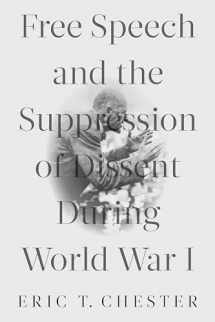
Free Speech and the Suppression of Dissent During World War I
Book details
Summary
Description
About the Author
Eric Thomas Chester was assistant professor of economics at the University of Massachusetts in Boston and, later, lecturer at San Francisco State University. In the 1960s, Chester was active in the civil rights movement and Students for a Democratic Society. He has worked as a cab driver, union organizer, and substitute teacher. He remains an activist in the trade union solidarity movement and the Socialist Party, and was the Socialist Party's vice-presidential candidate in 1996. He is the author of Socialists and the Ballot Box. His essays have appeared in the Cambridge Journal of Economics, Critique, Z, Insurgent Sociologist, Resist, Public Finance, Changes, and Against the Current.
A comprehensive history of the National Civil Liberties Bureau's role in the anti-war movement during the First World War
World War I, given all the rousing “Over-There” songs and in-the-trenches films it inspired, was, at its outset, surprisingly unpopular with the American public. As opposition increased, Woodrow Wilson’s presidential administration became intent on stifling antiwar dissent. Wilson effectively silenced the National Civil Liberties Bureau, forerunner of the American Civil Liberties Union. Presidential candidate Eugene Debs was jailed, and Deb’s Socialist Party became a prime target of surveillance operations, both covert and overt. Drastic as these measures were, more draconian measures were to come.
In his absorbing new book, Free Speech and the Suppression of Dissent During World War I, Eric Chester reveals that out of this turmoil came a heated public discussion on the theory of civil liberties – the basic freedoms that are, theoretically, untouchable by any of the three branches of the U.S. government. The famous “clear and present danger” argument of Supreme Court Justice Oliver Wendell Holmes, and the “balance of conflicting interest” theory of law professor Zechariah Chafee, for example, evolved to provide a rationale for courts to act as a limited restraint on autocratic actions of the government. But Chester goes further, to examine an alternative theory: civil liberties exist as absolute rights, rather than being dependent on the specific circumstances of each case. Over the years, the debate about the right to dissent has intensified and become more necessary. This fascinating book explains why, a century after the First World War – and in the era of Trump – we need to know about this.


We would LOVE it if you could help us and other readers by reviewing the book
Book review



